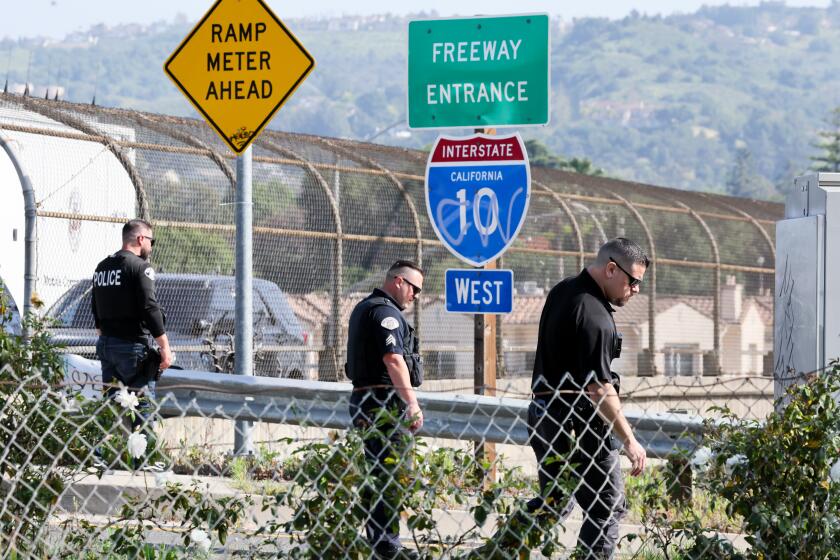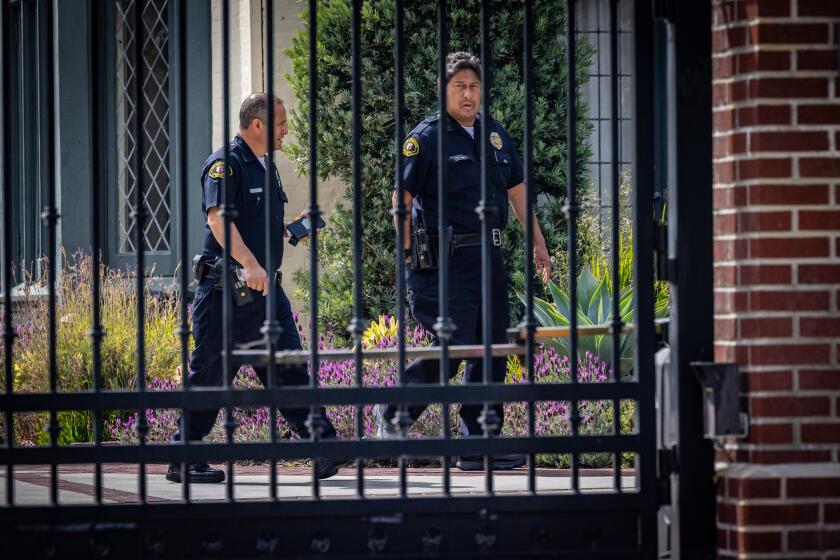‘The whole truth’ not always easy to find
DeWayne McKinney came to Sacramento this week in search of his pound of cash from a system that once was certain he was a coldblooded killer and then changed its mind. To borrow a phrase, what a long, strange trip it’s been, complete with the swearing-in of the man in the dark suit on the white horse who came to speak up for him Wednesday afternoon.
From the witness stand the day before, in the near-empty hearing room, DeWayne McKinney more than once used the word “predicament” to describe his 19 years behind bars, including stints at Folsom and San Quentin, three stabbings and a suicide attempt. Predicament, eh? A master of understatement, you might say. A man who was taken in when he was 20 and didn’t emerge into society again until he was 39.
Now 46 and freed from his life sentence since January 2000, McKinney’s biography suggests that nothing has been easy. Nor, it appears, will be getting the $700,000 he’s asking from the state board that reimburses people wrongly convicted.
McKinney is financially comfortable because of business ventures, so in a way, the compensation request is the final step on the way back.
Before the hearing began Tuesday, McKinney said the award would remove whatever stigma remains.
But to get the money -- based on a formula of $100 a day for each day behind bars -- he must prove his innocence. The attorney general’s office is arguing otherwise, and a state official said he’s not aware of a case where money was awarded over the attorney general’s objections.
It is not a token objection. In a 66-page report, the A.G.’s office concludes that “not only has McKinney not demonstrated his innocence, the evidence certainly seems to suggest that he was indeed the Burger King killer.”
Enter the man who took the stand after lunch Wednesday. Orange County Dist. Atty. Tony Rackauckas flew in for the occasion and told the hearing officer that he asked for McKinney’s release from prison in 2000 because his investigators convinced him that two other men had committed the robbery-murder at the fast food restaurant in Orange in December 1980.
Irony filled the room. Rackauckas was the young deputy D.A. who tried McKinney in 1982 and had asked for the death penalty. Had the jury gone along, McKinney may well have been executed before Rackauckas changed his mind on his guilt in 2000.
Before Rackauckas took the stand, I turned to McKinney in the row behind me and asked if the situation seemed surreal, another word he’d used when testifying. “Everything has been pretty much surreal,” he said, “not just this proceeding, but the whole case.”
Rackauckas spent about 75 minutes answering questions from both sides. Mike Farrell, a deputy attorney general, made it rather obvious he thinks Rackauckas’ investigators bought a bogus story from two habitual criminals who said they knew who committed the Burger King murder of night manager Walter Bell, shot once in the back of the head as four other employees were herded into a freezer.
The D.A. countered that the investigators were savvy enough to spot a phony story. He also noted that two of the four employees had backed off their identifications of McKinney over the years. In fact, the four identifications formed the core of the case against McKinney, against whom there was no physical evidence.
Rackauckas squared off against Farrell and, at times, sounded like the kind of defendant that prosecutors always gripe about. He couldn’t remember some things, parried some of Farrell’s more barbed remarks and at one point drew chuckles when Farrell was boring in on the credibility of the two men who exonerated McKinney. After the hearing officer overruled an objection, Rackauckas said he didn’t remember the original question, then ad-libbed to Farrell: “I don’t particularly want you to repeat it.”
Irony and comedy!
Rackauckas deserves kudos for showing up. He didn’t have to. He wasn’t subpoenaed. He knew he’d be opposing a fellow law-enforcement agency. He knows the act of freeing convicted killers can backfire. He had already expedited McKinney’s release seven years ago. He could have made up an excuse for not coming to the compensation hearing, which is all about money.
“He’s been really honorable in this entire process,” said Jeff Rawitz, an attorney representing McKinney. “He couldn’t have been a more stand-up guy in our contacts with him.”
Rawitz said beforehand he didn’t know how far Rackauckas would go in defending McKinney’s innocence.
When he asked him on the stand, Rackauckas paused a moment, then said, “I think it’s likely he didn’t commit the murder.”
Farrell pounced on the hesitation and asked if it were a difficult question. Rackauckas said it was because it is difficult to quantify doubts.
“Do you think he could be the Burger King killer?” Farrell asked.
“I think that’s possible,” Rackauckas said.
For those who think that’s waffling, I disagree. It’d be ridiculous to say he knew McKinney was innocent in a case that doesn’t yield certainty. Still, I confess to some surprise that Rackauckas put so much stock in two hard-case criminals’ counter-story about the Burger King murder, but he certainly didn’t do it to curry favor. In other instances, these are the kind of stories that prosecutors in many jurisdictions dismiss out of hand.
Since Rackauckas didn’t, you’d think a hearing officer would, in turn, put serious stock in the remarks of a district attorney who originally prosecuted the man seeking restitution.
After his testimony, Rackauckas talked a few minutes with me and a colleague. He said he wasn’t happy about opposing the A.G.’s office but felt he had a duty to testify. He said the issue of McKinney’s compensation wasn’t part of his motivation in coming. He reiterated that he supported McKinney’s release in 2000 because he was no longer convinced beyond a reasonable doubt of his guilt. However, he said, he doesn’t second-guess the decision to try him 25 years ago and is not in any way tormented by it.
We didn’t have enough time to probe his psyche. I don’t know if he’ll reflect on his original certainty of someone’s guilt -- built on various pieces that once seemed to fit -- only to realize a man did 19 years in prison and may be innocent.
That seems to me to be the point of McKinney’s saga. We want a system of both truth and justice, but because human beings run it, we sometimes get neither. The Burger King case centered on eyewitness identifications, which remains an area ripe for abuse when not handled properly. A retired professor who has researched the subject for 30 years testified that most wrongful convictions stem from eyewitness accounts.
I told Rackauckas my head was spinning. He nails McKinney in 1982, then springs him, then practically gets accused of letting a killer go free, then comes to testify on his behalf. It’s a justice system temporarily upside down.
The angriest guy in the room should have been McKinney. He’s the one who did hard time in the 1980s and ‘90s while Rackauckas was climbing the professional ladder. But McKinney has said since his release he holds no grudges and that, somehow, he grew up in prison and figured out a lot of things.
It all happened for a reason, McKinney said.
If only the rest of us could figure out what that reason was and try to get it right next time.
Dana Parsons’ column appears Tuesdays, Thursdays and Saturdays. He can be reached at (714) 966-7821 or at dana.parsons @latimes.com.
More to Read
Start your day right
Sign up for Essential California for news, features and recommendations from the L.A. Times and beyond in your inbox six days a week.
You may occasionally receive promotional content from the Los Angeles Times.






